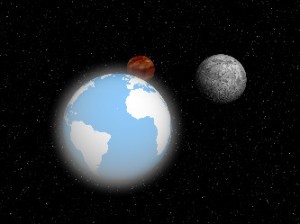Mining the Moon: How Your Mining Job Could Land You in Space
 Mining the Moon: How Your Mining Job Could Land You in Space
Mining the Moon: How Your Mining Job Could Land You in Space
“To boldly go where no one has gone before.”
That could just become your new mantra, as your current mining skills might actually land you in space. With every passing day, the earth’s population increases and the effect is an increasing strain on all of our natural resources. Therefore, it seems the question on everyone’s mind is – will we have enough fuel and minerals to see us through this century?
Some scientists and geologists are saying that private space exploration could lead to mining the moon or beyond, to alleviate the pressure on Earth’s natural resources. Even a passing asteroid could provide an abundance of raw resources and who better to tap into those astral veins than skilled mining operators?
Thanks to fallen fragments from space, scientists are able to determine the mineral components of various asteroids. A single platinum-rich heavenly body could provide more precious metal than what has ever been dug up on this planet. When you consider the vital role that platinum plays in reducing the price of electronics and improving electric circuit boards, then it becomes clear this is a commodity worth traveling into space for.
Far-fetched idea, you say? As it happens, a mining company named Planetary Resources has just been established by some very prominent entrepreneurs. This outer space enterprise was formed as a partnership between former Google executives and famed sci-fi cinema director James Cameron. Teaming with Virgin Galactic, they hope to hitch a ride on one of their sub-orbital crafts. That could be enough to propel a ship beyond earth’s orbit and into the flight path of a passing asteroid. It wouldn’t be a stretch to imagine a mining mission being set up on one of those “rocks.”
Clearly, there will be a whole range of challenges to overcome when mining outer space. New technology and tools will have to be manufactured. And workers will need to train in zero gravity environments just like the astronauts question of who can claim ownership of an astral body.
As all of this is being sorted out, there will be numerous job opportunities for veteran workers who are willing to experiment with new methods and technologies. There will be a need for experienced workers who will be testing the limits of the technologies, including setting up safety standards. Current miners might even have a leg up on being selected for the astronaut training since they are already used to working in extreme conditions, while often utilizing an external breathing apparatus.
Although there might not be an immediate mission to Mars, the company is accepting applications for internships. Planetary Resources has put out the call for a couple of General Space Nuts. The application questions are meant to be taken in fun, with questions like “What name would you give a crash test dummy?” and “Are you a space nut? Prove it!”
All jokes aside, signing up to work with a company like this could present an opportunity to get in on the ground floor of a very exciting venture. Remember, in 1961 we barely had a space program. Within eight years, we had landed a man on the moon.
Is mining in space really that far out?

